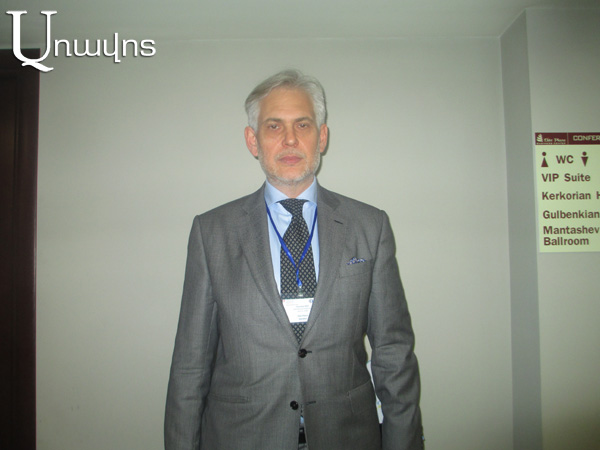Aravot.am asked Dan Petre, director general of the Romanian Diplomatic Institute about the Velvet Revolution in Armenia, what does he think about it and what perspectives do the bilateral relations between Armenia and Romania have.
“Velvet revolutions are forms of defusing internal attention, and it’s good when it’s velvet. I’m coming from a country which has not undergone a velvet revolution. We see that in the first years, ten years, it is polarising the society. From my impression, I can say that it brings a lot of hope that things will change for the better. It is for Armenians to judge how everything is going. We understood that in our countries, which have undergone different processes, one of the things you learn twenty seven years after is that it takes time. I remember that after 1999 we thought everything would be solved in six months, unfortunately, twenty-something years after my head got grey hair and something are not yet solved,” he replied.
Referring to the relations with Romania, Dan Petre said: “Look, I was here twenty years ago for a state visit by our former president at that time, Romania is, I think, the first country in which an Armenian has got a seat in the parliament as an Armenian, not as a general MP, which is not anymore my good friend Varuzhan Guzganyan. We have longstanding relations with the Armenian community in Romania, the first Armenian community that we know in Romania was in the fifteenth century, it’s not that it’s a strange country. We still have Armenian community, lots of friends in different circles, in the economy, in culture. So, yes, it can be, but it’s up to you. As I said it’s a long history, you had excellent and have excellent ambassadors to Bucharest, the conditions are there. There are a lot of ways to do.”
Dan Petre also referred to the foreign policy of Armenia: “The relationship of Europe, NATO, the member states with Russia are being diplomatically speaking badly. But look, you will have elections, discuss that freely in your country, set a choice, that’s the democratic rule. We took that path twenty-twenty five years ago, but that was our free choice. As I said it is up to you. Well, we will judge in a certain moment, but besides judging, as I said, it is up to the Armenians, to everybody to make their mind. I am not an expert in purely Armenian affairs, I don’t speak Armenian, unfortunately. What is said in the Armenian press is not up to me to judge, as I said in certain ways things have to be judged. Look for that in the elections and see what is the vote of the people, that is what the democracy is about.”
The Romanian parliament is discussing the EU-Armenian agreement, we asked him what repercussions will have the agreement for Armenia, any reforms? “It is up to the Armenian government, as the association of the agreement was tailored so that the partners will pick up just what they want. Of course, there is, I would say, an indirect effect of both agreement and non-agreement. In different parts along Europe, we saw that a certain duplication will happen, regardless of if it’s a juridical form of agreement between Europe and the third country or if there is not. So, yes it will push for a some kind of changing in your society, I would not say reforms, but it changes the environment, it is very simple, and you see that the people are having different lives, let me not lecture you. The things are changing, the people will travel more freely, that you get into kind of a Erasmus+ program, etc., so yes, it will change, but it is very up to the partners to see what they want to change and how much they want to change,” Dan Petre replied.
Free visa regime is believed to follow the ratification of the agreement. According to Petre, it eases things a lot: “We have worst concerns than with illegal migration. I do not see a problem in free circulation.”
Hripsime JEBEJYAN



















































